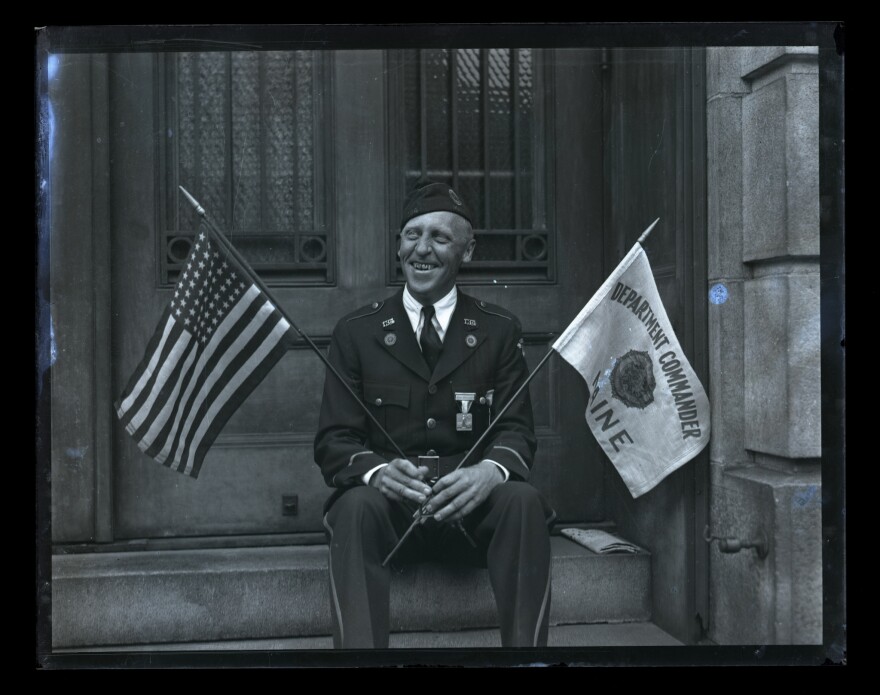"The world must be made safe for democracy." With those words, President Woodrow Wilson committed Maine, and the rest of the country, to fight in World War I. It was April 2, 1917. To mark the coming centennial, the Maine Historical Society opens a new exhibit in Portland today. It's curator, Jamie Rice, spoke with Maine Public Radio's Irwin Gratz. She cited a 1940 University of Maine study that found Mainers in sync with the rest of the country about the brutal, European conflict.
RICE: They were decidedly neutral, although you do see a lot of pro-ally, pro-British, pro-French conversations in the newspaper. But, in general, the United States wanted to stay out of the war. it was an "America first" attitude, which is something we can relate to today, certainly. But, almost overnight, when the United States decided to join the war, in April, Maine, as with most of the country, immediately rallied behind the United States government. And enlisted, instituted Selective Service, which is the draft, and really pulled together as a state, and as a country. And I think a little bit more so because we're a coastal community and where the proximity directly across from Europe and our exposure to submarine warfare, which was a big issue during World War I.
GRATZ: Of course, in the Second World War, Maine in general, Portland in particular, got very involved in shipbuilding for the war effort, that kind of manufacturing. Was there anything like that going on during the First World War?

RICE: Absolutely. The ship building, the manning of the Casco Bay forts, all of that stems to World War I. Portland's population swelled tremendously. There were individuals and servicemen at Fort Williams, Great Diamond island, on Cushing. So, a lot of those things that people have come to expect with the Second World War, really find their origins in the First World War. In fact, a lot of people say it's just one large world war with a small break in between.
GRATZ: What are some of the things people will see that you'll have on display when this is fully mounted?
RICE: Well, we've divided into a series of themes or a series of sections. We'll talk about neutrality and we have some lovely pieces, photographs and correspondence. Also, from the home front, a lot of wonderfully illustrated posters that outline the way that the state of Maine, and the country, really, rallied behind the food rationing and fundraising for the war. We have materials from servicemen, both at home and abroad: everything from a machine gun, an 1895 machine gun we borrowed from the Bucksport historical society, to uniforms, gas masks, helmets and other pieces. But I think one of the most exciting things, and something we don't have a lot of opportunity to be able to share, are the costumes from the period. And we'll feature both military uniforms and some wonderful examples - Maine examples - of civilian fashion, women's fashion during the period.

GRATZ: What's the relevance to people today of what happened 100 years ago?
RICE: I think people will draw a lot of similar conclusions between the attitudes and the rhetoric and the politics of the period, and what they see today. The birth of American hyphenism, defining yourself as an Irish-American or a German-American, that stems from the World War I period. That identity where you can be something other than American, but yet still be patriotic, stems from this period. German-Americans were forced to register with the state government during World War I and 100 years later, a lot of issues in Syria, issues in Palestine, a lot of these stem from the restructuring of World War I. Hopefully, what this exhibit will do, is allow this to resonate with people - that how important and how vital World War I is to American history; is to world history. It's often overshadowed by World War II.
Curator Jamie Rice walks Irwin Gratz through some of the clothing items in the World War I exhibit.
https://www.youtube.com/watch?v=eRKZzV5_sJk&feature=youtu.be
Video: Irwin Gratz
Jamie Rice is the director of Library Services for the Maine Historical Society. She also assembled the new exhibit: "World War I and the Maine Experience," which opens today at the Historical Society's gallery in Portland.



